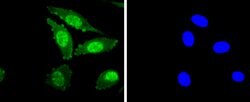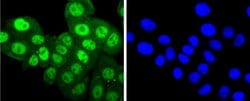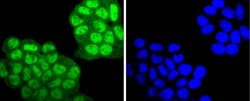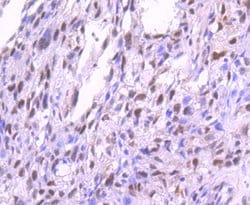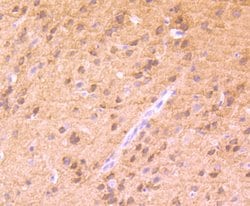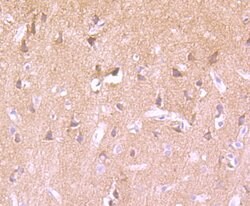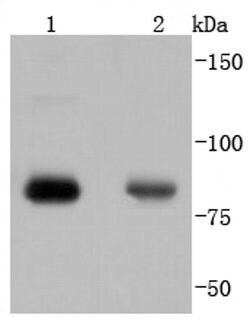Learn More
Invitrogen™ Phospho-PKC alpha (Thr638) Recombinant Rabbit Monoclonal Antibody (JF0964)
Rabbit Recombinant Monoclonal Antibody
Supplier: Invitrogen™ MA532506
Description
Recombinant rabbit monoclonal antibodies are produced using in vitro expression systems. The expression systems are developed by cloning in the specific antibody DNA sequences from immunoreactive rabbits. Then, individual clones are screened to select the best candidates for production. The advantages of using recombinant rabbit monoclonal antibodies include: better specificity and sensitivity, lot-to-lot consistency, animal origin-free formulations, and broader immunoreactivity to diverse targets due to larger rabbit immune repertoire.
The PKC family of serine/threonine kinases, including PRKCA (PKC alpha), is activated intracellularly by signal transduction pathways. In humans, at least 12 different PKC polypeptides have been identified. These isoforms differ in primary structure, tissue distribution, subcellular localization, mode of action in vitro, response to extracellular signals, and substrate specificity. PKC alpha, beta I, beta II, and gamma form the conventional family; their activities are Ca2+- and phospholipid-dependent. Protein kinase C (PKC) can be activated by calcium and the second messenger diacylglycerol. PKC family members phosphorylate a wide variety of protein targets and are known to be involved in diverse cellular signaling pathways. PKC family members also serve as major receptors for phorbol esters, a class of tumor promoters. Each member of the PKC family has a specific expression profile and is believed to play a distinct role in cells. The protein encoded by this gene is one of the PKC family members. This kinase has been reported to play roles in many different cellular processes, such as cell adhesion, cell transformation, cell cycle checkpoint, and cell volume control. Knockout studies in mice suggest that this kinase may be a fundamental regulator of cardiac contractility and Ca(2+) handling in myocytes.
Specifications
| Phospho-PKC alpha (Thr638) | |
| Recombinant Monoclonal | |
| 1 mg/mL | |
| TBS with 0.05% BSA, 40% Glycerol and 0.05% sodium azide; pH 7.4 | |
| P05696, P17252, P20444 | |
| PRKCA | |
| Synthetic phospho-peptide corresponding to residues surrounding Thr638 of Human PKC alpha aa 622-667. | |
| 100 μL | |
| Primary | |
| Human, Mouse, Rat | |
| Antibody | |
| IgG |
| Immunohistochemistry (Paraffin), Western Blot, Immunocytochemistry, Western Blot | |
| JF0964 | |
| Unconjugated | |
| PRKCA | |
| AAG6; aging-associated gene 6; AI875142; EC 2.7.11.13; FHC; FTH; FTHL6; im:7139045; kinase PKC-alpha; KPCA; MGC104426; PIG15; PKC III; Pkca; PKC-A; PKC-alpha; PKC-III; PKRCA; PLIF; PRKACA; Prkca; prkcaa; protein kinase C; protein kinase C alpha; protein kinase C alpha type; protein kinase C alpha type; protein kinase C, alpha, a; protein kinase C, alpha; protein kinase C, alpha, a; protein kinase c-alpha; si:dkey-8l19.1; Unknown (protein for IMAGE:7139045); unnamed protein product | |
| Rabbit | |
| Protein A | |
| RUO | |
| 18750, 24680, 5578 | |
| Store at 4°C short term. For long term storage, store at -20°C, avoiding freeze/thaw cycles. | |
| Liquid |
Your input is important to us. Please complete this form to provide feedback related to the content on this product.
